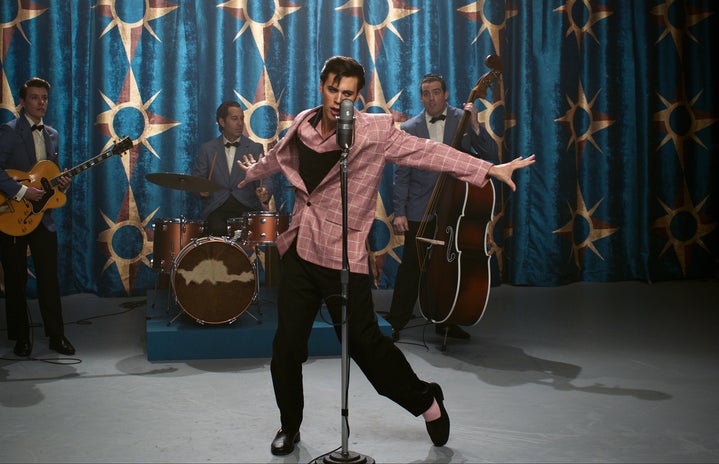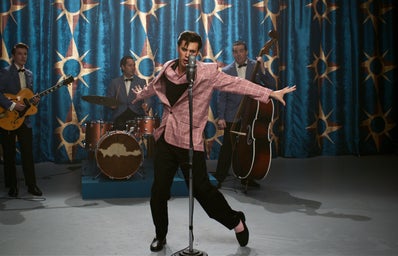Elvis. Pam and Tommy. King Richard. The Dropout. House of Gucci. Inventing Anna. The Eyes of Tammy Faye. The Girl From Plainville. The list goes on.
You’ve probably caught on to the pattern. These are the titles that have been flooding movie theaters and streaming services, all based on real events and people. If you’re like me and 85% of my surveyed peers, you’ve noticed an uptick in biopics and inspired-by-real-life entertainment in Hollywood lately.
But why is this occurring? Is it intentional? Is it the new normal in entertainment?
I sat down with filmmaker and editor Cole Greenbaun, an NYU Tisch Film & Television graduate, to discuss some of his possible theories on this trend.
First, let’s look at how movies and tv shows are produced.
Before a movie is shown on the silver screen, filmed, or even in pre-production, they have to be greenlit, which means they’ve gotten the approval and the finances to start producing. A proposed film typically has a whole creative team, as they need to have a script, an attached director, and a producing team to finalize the funding to even reach the point of being greenlit.
So we should take a look at the scripts that are being circulated. Of the people I surveyed through Instagram, 53% of voters believe that the recent biopic trend stems from a “lack of originality” in Hollywood or that Hollywood is “running out of ideas.” According to Greenbaun, this assumption may not necessarily be unreasonable, but the increase in using real-life events as inspiration is more likely due to the “safety net” they provide for producers.
“There’s a little bit of safety for producers making something that’s based off a true story because chances are, someone has heard about it. […] They’re capitalizing on the fact that it’s something that happened almost recently that you may have heard of. And if it’s a salacious story, and people are really interested in the juicy details of what went down, then I think that’s another element on top of that. It’s just building on elements of ‘How do I get someone to watch this?’”
So a big reason many projects tend to use biopic material is that they are more likely to have attached producers and be greenlit in the first place, due to their low-risk nature.
But why have there been so many projects recently, in general?
“There’s a thirst for content right now,” Greenbaun reasons. “Streaming services are getting close to peaking in how big they’ve gotten, and the biggest thing is just a need for content. It doesn’t really matter nowadays what it is.”
This would explain why streaming services, especially Hulu and Netflix, have been the leading sources of most recent biopic or inspired-by-real-life entertainment, all created as “Originals” on the site. As streaming services compete with each other, they’re more likely to approve any project to supplement their site with something that can only be found on their service. And if the story happens to be about an actual, juicy scandal that brings in viewers, the better!
The huge escalation in biopic television might strongly be correlated to streaming service demand, but there’s been a less noticeable but equally imposing increase in biopic films in the past decade. If we look back on the most recent decade (2011-2021) of Academy Award Best Actor and Best Actress Winners, only one year, 2016, did not have a winner who played a real person in one or both categories.
“Hollywood right now is rewarding actors for getting as close to the source material as they can. It’s almost like a game of impressions.”
In other words, biopic films are Oscar bait. So, it’s reasonable to assume that A-list actors and actresses will star in them without hesitation, making box office success more promising, which is reassuring to producers, so in a cycle, more and more biopic projects are going to keep being produced.
Finally, seeing the overall increase in biopic material showing up on our screens begs the question,
Are biopics ethical? Are they socially responsible?
There isn’t a clear-cut answer.
Biopics are inherently marketed as “true” stories, but their accuracy to real life can certainly range from straightforward reenactments to dramatizations where the only similarity the story has with real life is the protagonist’s name. Pretty concerning, especially when we consider the way these projects memorialize figures, as 83% of my surveyed peers believe they do.
“When you choose to tell a story about someone, you are choosing to memorialize them in some way,” Greenbaun comments. “It doesn’t matter if they are good or bad.”
I’m sure many of you can reflect on your own perceptions of historical or cultural figures. How one-dimensional are they? How sensationalized? They’re probably more of a caricature than a representation of a fleshed-out human, let alone the actual person who lived.
Memorialization, dramatization, sensationalization, and simplifying of real events and people to tell a story have been utilized in other forms of art in plenty of ways, but Greenbaun emphasizes the complications that arise when doing so in film and entertainment.
“If I painted Elvis, and made that a piece of art, people obviously know that’s not Elvis, it’s a painting of Elvis. But with filmmaking, where people use makeup to look as close to the real person as possible and you’re trying to convince people that [the story] was real life, you start running into these ethical conundrums.”
Not only are audiences generally susceptible to memorializing people, but they may also specifically do so under the impression that the storylines that they watched a dramatized or entirely fictionalized version of a real person’s experience are accurate. Greenbaun reminds us that it’s important to keep in mind that “a lot of biopics are going to find stuff that’s not realistic in them because it’s hard to make things have conflicts and be interesting. [Writers] find [themselves] leaning towards, ‘Well, I gotta give this character an arc, and I gotta get them from place A to place B. So how am I getting them there?’ and [they] start inventing stuff.”
Many creatives admittedly only loosely base their biopics projects on the people and events who inspired them, placing the responsibility of ethical consumption on the viewer. The main issue with this is that audiences often can’t actually watch these pieces with any significant insight about how truthful the biopic adaptations are to reality. This could be out of a lack of public information, having no desire to research, or simply because creatives have imposed too heavy of a filter over technically true events, that discerning between an accurate portrayal of reality and an artistically-driven narrative becomes difficult.
Let’s consider the recent Amazon Original Being the Ricardos, written and directed by acclaimed screenwriter Aaron Sorkin about Lucille Ball and Desi Arnaz. Lucie Arnez, the couple’s daughter, showed support for the film, insisting that the depictions of her parents were accurate to their essence, though the plot may not have been.
“However,” as Greenbaun points out, “that movie starts with fake talking head interviews of people who were the [characters of the] writers on the show, describing that week. It starts by using documentary-style [storytelling] to give it a sense of legitimacy, which I found pretty egregious.”
In just this one example, we can see how gray and “murky” the ethical consideration of biopic entertainment can be. On one hand, direct sources played a certain level of involvement in the process and established credibility for audiences about how realistic portrayals were within the story. And on the other hand, the writing and direction also allowed for elements of massive creative liberties and narratives to slip through, possibly without viewers fully catching on to their inaccuracies and persuasiveness. How could audiences be tasked with mindful watching, let alone blame them for cementing a certain image of these figures when they ingest stories containing such ambiguous mixtures of truth and fiction?
Ultimately, it’s arguably human nature to tell stories of other people, and in doing so, memorialize them.
“But who’s to say that we are the best tellers of our own story? Is it going to be truthful, then? Our natural human tendencies want us to look as good and cool as we hope we are, and we want everyone to think we look good, too.”
In the same way that it’s possible for a biopic to be both truthful and deceiving, we, as a society, can enjoy biopics for enlightening us about the reality of figures while also being mindful that certain aspects of our understanding will inevitably and always be misrepresented.


